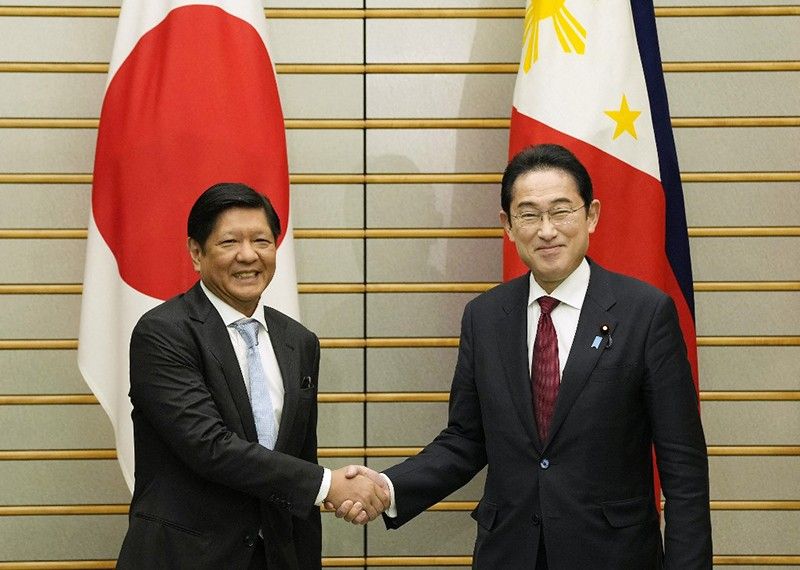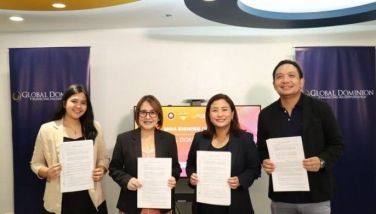Sharing risks and building stronger partnerships in the Indo-Pacific

In one of his recent statements, President Ferdinand Marcos Jr. shared his thoughts on the increasingly complex Indo-Pacific. Aside from highlighting the importance of economic partnerships, he emphasized the need to forge closer political ties and stronger defense cooperation with major powers in order to address emerging security challenges in the region. Since taking office in July of last year, Marcos has made several foreign trips to strengthen the country's capacity to adapt to changing geopolitical realities.
For instance, his official visit to Tokyo on Feb. 8, 2023, can be considered a positive step forward especially as the US-China rivalry continues to intensify. During the visit, Marcos expressed his intent to take the country’s relations with Japan to the next level, highlighting its role as a major security partner in the region. To add a "new element" to the relationship, Marcos and Prime Minister Fumio Kishida reaffirmed their commitment to strengthening defense and security cooperation through bilateral consultations at all levels. This includes the Foreign and Defense Ministerial Meeting (“2+2”), the Vice-Ministerial Strategic Dialogue as well as the Political-Military (PM) Dialogue.
There was also a discussion on the current situation in the East and South China Seas and both leaders strongly opposed the use of force or coercion that could escalate tensions. Moreover, Marcos also welcomed Japan’s commitment to preserving peace and stability in the Indo-Pacific through its new National Security Strategy (NSS), National Defense Strategy (NDS), and Defense Buildup Program (DBP).
In the context of the West Philippine Sea, Japan has played a critical role in providing assistance to the Philippines. Aside from various training and scholarship opportunities for the Philippine Coast Guard (PCG), as well as JICA's regular dispatch of experts, Japan has also provided maritime patrol aircraft, coast guard vessels, and other necessary assets to help develop the country’s capacity to respond to security challenges in the disputed waters.
During the visit, Marcos and Kishida both acknowledged the importance of initiatives to strengthen Maritime Domain Awareness (MDA) and maritime law enforcement based on international law. They have also pledged to expand maritime cooperation through initiatives such as reciprocal port calls and aircraft visits, as well as the transfer of more defense equipment and technology. Prime Minister Kishida also mentioned initiatives to facilitate knowledge transfer and best practices through “Sapphire” in collaboration with the US Coast Guard.
In a recent forum organized by the Stratbase ADR Institute, together with the Embassy of Japan and the Embassy of the United States in the Philippines on “Strengthening Partnerships Toward a Free and Open Indo-Pacific”, Prof. Miyake Kunihiko, director of the Japan-based think tank, The Canon Institute for Global Studies’ Research said that a trilateral cooperation with the Philippines, Japan, and United States is a “natural process” considering the evolving security environment in the region.
“It’s another natural process because the (South China) sea is wide and big, and ships are limited, so it’s pretty natural that instead of one country doing the whole thing, more countries work together to cover as much area as possible … we have to do this in order to maintain the status quo and prevent them from being changed by force. I think it’s a matter of time,” Kunihiko said.
The current administration's recent efforts to share risks and build stronger partnerships with like-minded states have enabled the Philippines to strategically position itself to advance its strategic interests. Although there are still existing gaps in the country’s defense capacity and approach in responding to security challenges, particularly gray zone activities, these initiatives have highlighted the mutual benefits of working with states that share the same fundamental values.
Given the region's complex security challenges and the risks posed by China's growing assertiveness, the Philippine government should also consider strengthening mechanisms for sharing information with its traditional ally, the United States, and key partners such as Japan, Australia, and members of ASEAN and the EU. Marcos should also look into increasing capacity building and modernization efforts for the Armed Forces of the Philippines and the PCG. An inter-agency approach in identifying, and responding to, gray zone activities should also be prioritized in order to effectively respond to threats, especially in the maritime domain.
In contrast to the previous administration, Marcos has also taken active steps to balance the country’s relations with China and the United States. This can be seen in his state visit to China early this year, where he advocated for stronger economic cooperation with Beijing, as well as his recent approval of new Enhanced Defense Cooperation Agreement (EDCA) sites, which expands the access of the United States to military bases in the Philippines.
This “balanced” approach has allowed the Philippines to strategize better and move beyond the US-China strategic rivalry. Consistent with his earlier statements, Marcos has been trying to pursue a foreign policy that is not guided or shaped by either China or the United States. Whether or not this trend continues ultimately depends on his will and leadership, as well as the credibility of the government institutions and defense establishments behind him.
Jikko Alfonso Puzon is a research manager at think tank Stratbase ADR Institute and a visiting research fellow at the Japan Institute of International Affairs (JIIA).
- Latest





























